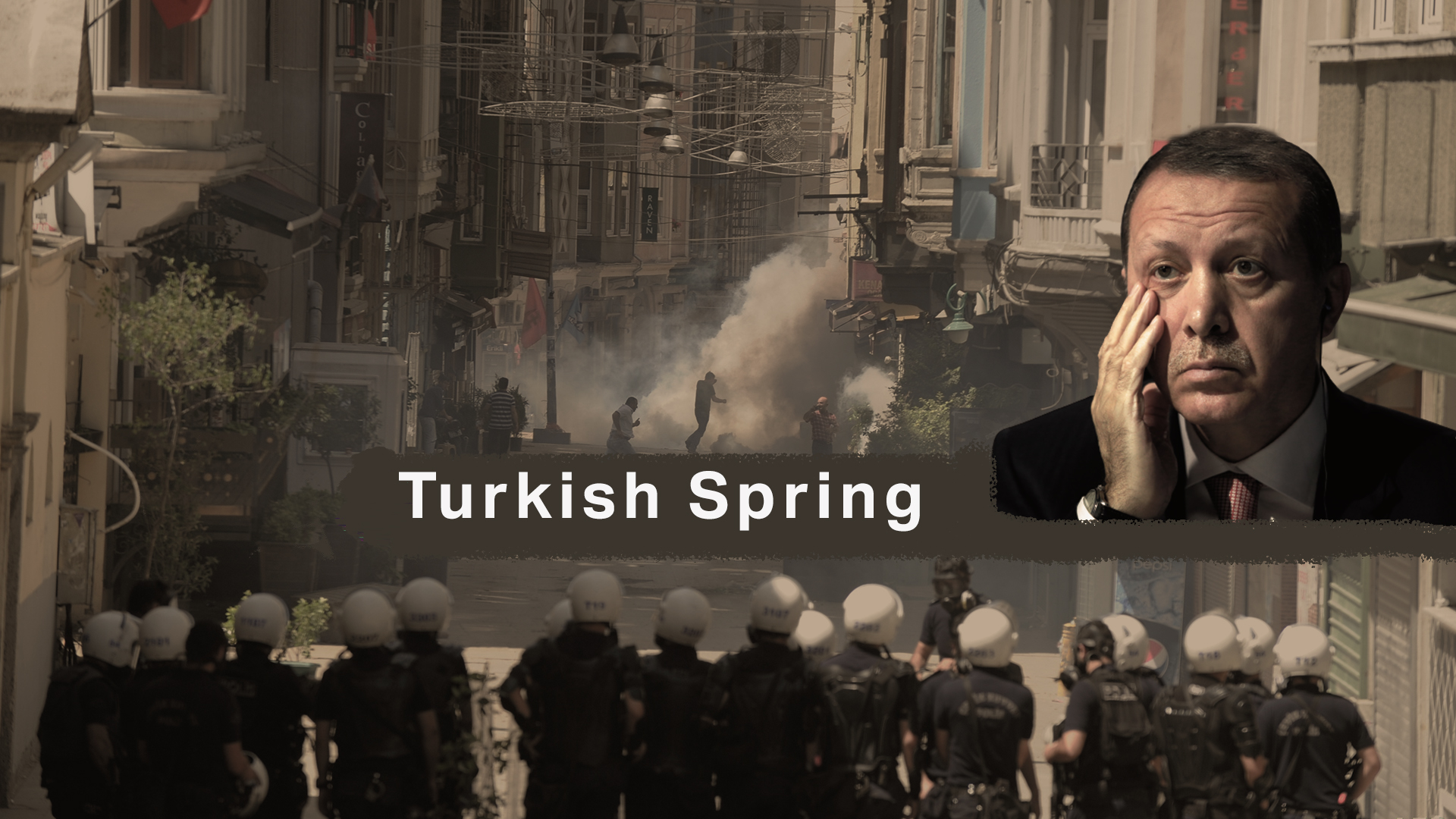Turkish Spring

With the Justice and Development Party (AKP), led by Erdogan, took power, the features of the Turkish state began to change from a secular state to an Islamic one seeing himself as a sultan and dreaming of building a new Ottoman empire, and turning the Turkish regime into a dictatorship. In order to preserve his power, he allied with the national movement, canceled the peace agreement with the Kurdistan Workers Party (PKK), and exploited the alleged military coup so that to serve his own goals and ambitions. He launched a campaign of arrests that targeted all groups, including military, politicians, journalists, businessmen and civilians, which made Turkish prisons overcrowded on pre-prepared charges of their association with the Gülen movement or the PKK to eliminate his opponents and increase his power even more. The constitutional amendments in the spring of 2017, such as the abolition of the position of Prime Minister, and granting the new executive presidency the power to appoint judges, without consulting the Parliament, allowed him to exercise executive authority as president of the republic. This provided an opportunity for Erdogan to select judges loyal to him in order to ensure legal decisions that suit his party and take into account his priorities, and the amendments gave him greater control over the armed forces. As the constitutional amendments strengthened the powers of the president, he became the country’s chief legal officer .
The internal and external policy pursued by Erdogan made Turkey in a state of confusion. Internally, the country was hit by an unprecedented economic crisis, as inflation reached more than 36% within one year, a record number since September 2002, due to the decline in the value of the Turkish lira. In this context, Erdogan dismissed the head of the Statistics Authority, Said Erdal Dinger, after revealing the real inflation rate in Turkey. Many economists believe that the causes of the current economic crisis in Turkey are due to Erdogan’s policies, as Ahmet Davutoglu stated that “Erdogan does not understand the economy, and the people around him do not understand the economy, he is on another planet.” After nearly two decades in power, Erdogan has fired every economic official who stood in the way of his economic policy which contributed to the country’s arrival to this crisis, which makes the Turks face difficulty in securing their needs, including medicines. Also, “the dismissals and resignations” give an indication of the lack of independence of Turkey’s monetary policy, which may negatively reflect on the investment sector, especially after the Turkish government raised the prices of electricity and fuel. Externally, Erdogan has intervened in all regional and international crises without exception: Syria, Iraq, Libya, Yemen, Tunisia, Azerbaijan and Afghanistan, and drained state resources in order to spend on his military interventions instead of paying attention to his country’s internal crises where it has become a heavy burden on the Turkish street. Erdogan also pursued a policy of investing in wars and keeping an eye on the region’s wealth, with the aim of saving his collapsed economy, securing foundations for his party, establishing his rule, distracting the remaining army leaders in new wars, drowning his country in useless military gambles, and inciting free hostilities which were indispensable, especially towards its allies.
As a result of this policy, the AKP has begun to witness an erosion in its popularity in light of the continued bleeding of resignations, as the ruling party, which has been living for nearly two years on the impact of splits among its most prominent founders and leaders, is rejection of the party’s policies that are not in line with Turkey’s economic, security and political needs. By the end of 2021, Erdogan’s popularity had fallen dramatically, with opinion polls indicating a drop in his popularity from 52% to more than 30%. Also, 64% of the Turks do not believe that the government is capable of solving economic problems. Therefore, it is obvious that there are calls for early elections to save Turkey from falling into the abyss, and intensive meetings of opposition parties in order to stand up to the ruling party, to get the country out of the crises that are afflicting it.
However, Erdogan’s stubbornness in his domestic and foreign policy may bring on Turkey a barrage of repercussions and crises with dire consequences. This intransigence made the main Turkish cities witness protests and an escalation in which the Turkish street, sooner or later, and more than ever, according to expectations, is heading towards a popular revolution or an uprising against Erdogan and his party. It is doubtful that he will relinquish power without a fight, and because Erdogan fears that if he loses the elections, he will open corruption files that condemn him and his inner circle. Therefore, most of the expected scenarios within this policy pursued by Erdogan are similar to what happened in the Arab countries, the “Arab Spring”, in order to maintain power, Erdogan and his supporters may resort to internal destabilization, engage in foreign wars, especially in Syria, and make concessions to some countries with economic and political weight such as the UAE, Saudi Arabia, Israel and the US to obtain economic and political support enabling him to win a third term. In the event of his failure to extricate the country from its economic and political crises and the continued deterioration of his popularity ahead of the elections, he may resort to rigging the election results or accusing his rivals of treason and imprisoning them, to ensure his victory for a new term. So, it is not easy to exclude or relinquish power, and many corruption files are chasing him, which will turn the Turkish street upside down.




